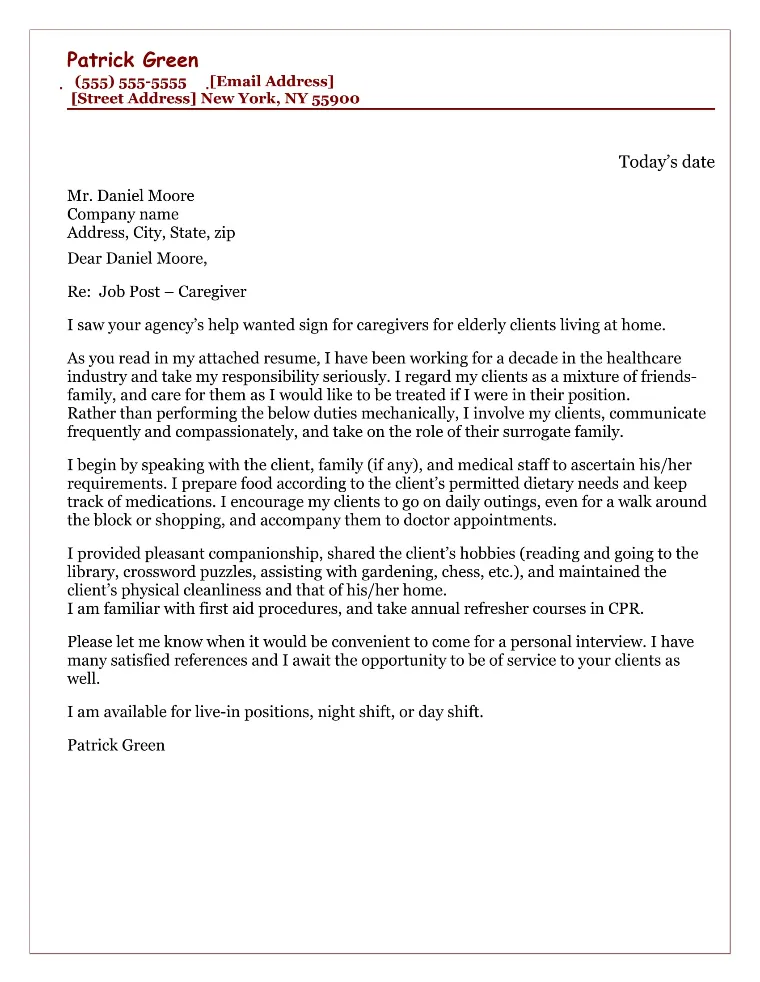Crafting the Perfect Caregiver Cover Letter
A well-crafted caregiver cover letter is your first opportunity to make a positive impression on a potential employer. It’s more than just a formality; it’s a crucial tool that can significantly increase your chances of landing a job interview. This guide provides a comprehensive overview of how to create a compelling caregiver cover letter that highlights your skills, experience, and personality, ultimately helping you get hired fast. From understanding the fundamental importance of a cover letter to mastering the art of showcasing your qualifications, this article equips you with the knowledge and strategies needed to stand out from the competition. We will explore the essential elements, from the opening paragraph to the closing call to action, ensuring that your cover letter effectively communicates your value as a caregiver and resonates with potential employers. Let’s get started.
Understanding the Importance of a Cover Letter
A caregiver cover letter serves as a personalized introduction, allowing you to connect with the employer on a deeper level than a resume alone. It’s your chance to explain why you’re the ideal candidate, going beyond just listing your qualifications. In the competitive field of caregiving, a strong cover letter is crucial for setting you apart. It demonstrates your communication skills, your genuine interest in the position, and your ability to understand and meet the specific needs of the care recipient. The cover letter enables you to showcase your personality, empathy, and dedication, which are vital qualities in caregiving. By taking the time to tailor your cover letter to each job application, you show employers that you are serious about the role and committed to providing excellent care. Failing to include a cover letter can signal a lack of attention to detail or a lack of genuine interest, potentially costing you the opportunity to be considered for the position.
Highlighting Your Caregiving Skills and Experience
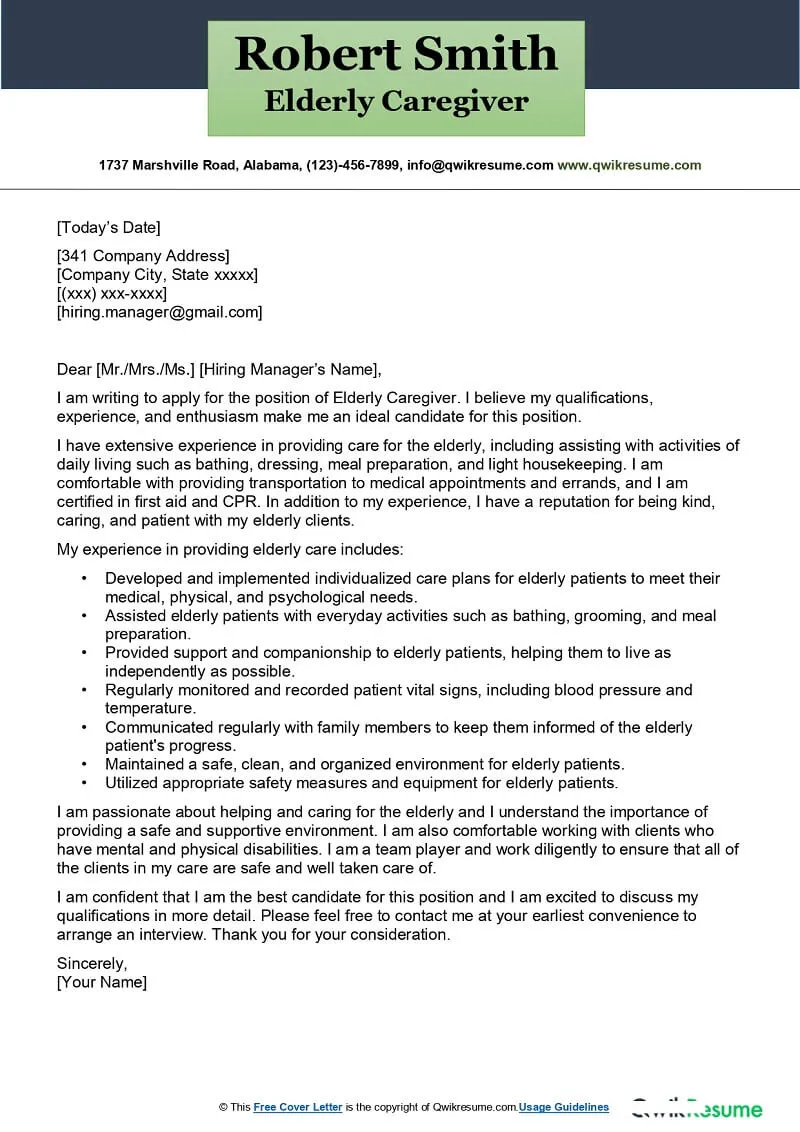
The core of a successful caregiver cover letter lies in effectively highlighting your skills and experience. Employers are looking for specific qualities and abilities that align with the needs of the care recipient. When crafting your letter, focus on demonstrating how your skills and experience directly relate to the job requirements. Provide concrete examples of how you’ve applied these skills in previous roles, using quantifiable results whenever possible. For instance, instead of just stating you provided personal care, mention the specific types of care you provided and how you ensured the comfort and well-being of your patients. Emphasize your ability to adapt to different situations, your proficiency in managing medications, and your experience in assisting with daily living activities. Show employers that you are not just qualified but also passionate about providing compassionate care, helping them feel confident that you can meet and exceed their expectations.
Skills to Showcase in Your Cover Letter
In the caregiver field, certain skills are universally valued by employers. Highlighting these skills prominently in your cover letter can significantly boost your application’s appeal. Focus on skills that demonstrate your ability to provide comprehensive care, from basic personal care to more specialized medical assistance. Consider including the following skills to show you are an ideal candidate. Demonstrate a blend of practical abilities and soft skills that showcase your suitability for the role.
Empathy and Compassion
Caregivers must have a deep well of empathy and compassion. Employers seek individuals who genuinely care about the well-being of their patients. In your cover letter, highlight instances where you’ve shown empathy, such as providing emotional support during difficult times or going the extra mile to ensure a patient’s comfort.
Communication and Interpersonal Skills
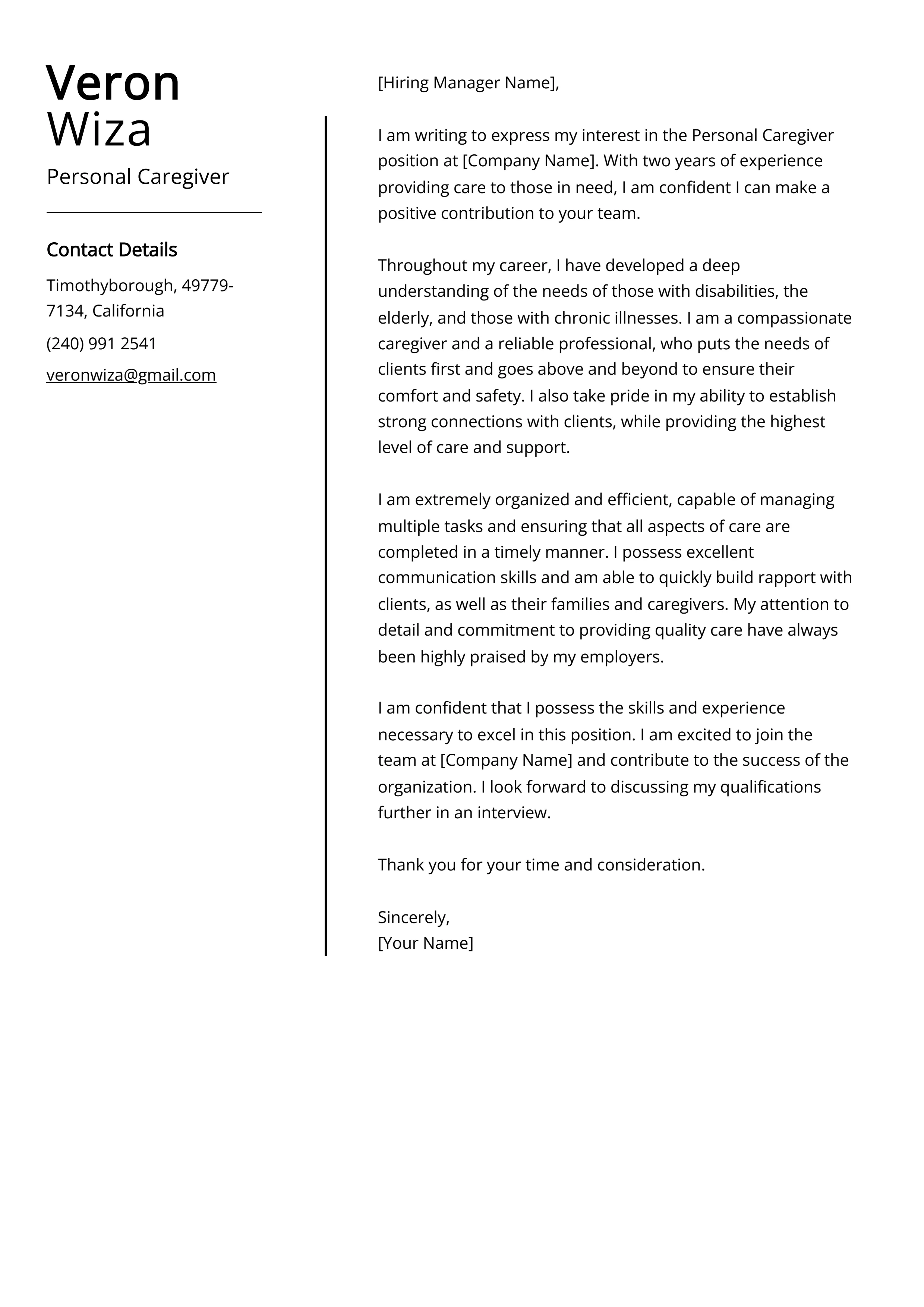
Effective communication is essential for building trust and rapport with patients and their families. Showcase your ability to communicate clearly, actively listen, and adapt your communication style to meet the individual needs of each patient. Mention any experience you have in communicating with healthcare professionals.
Patience and Adaptability
Caregiving often requires patience and the ability to adapt to unexpected situations. Provide examples of how you have remained calm and composed under pressure. Highlight your ability to modify your care approach to meet the changing needs of the care recipient.
Experience to Mention
Detail your caregiving experience, including the specific types of care you’ve provided and the populations you’ve worked with. Mention the number of years you’ve worked as a caregiver and the range of responsibilities you’ve handled. Providing concrete examples and quantifying your achievements can make your application more impactful. Employers will be impressed when you provide a clear view of your past performances.
Specific Caregiving Tasks

List specific caregiving tasks you’re proficient in, such as medication management, meal preparation, personal hygiene assistance, mobility support, and companionship. Tailor this list to match the job requirements, emphasizing the tasks that align with the employer’s needs.
Certifications and Training
Include any relevant certifications or training, such as Certified Nursing Assistant (CNA), CPR certification, First Aid training, or specialized training in areas like dementia care or hospice care. Mention the dates of certification and the issuing organization. Highlighting your professional development demonstrates your commitment to providing high-quality care.
Tailoring Your Cover Letter to the Job
Generic cover letters rarely impress employers. To truly stand out, you must tailor your letter to each specific job application. This means carefully reviewing the job description, identifying the key requirements, and aligning your skills and experience accordingly. This approach shows the employer that you have taken the time to understand their needs and are genuinely interested in the position. By showing that you are fit to the description, you’ll increase your chance of getting hired. This will also help make a good first impression.
Researching the Employer
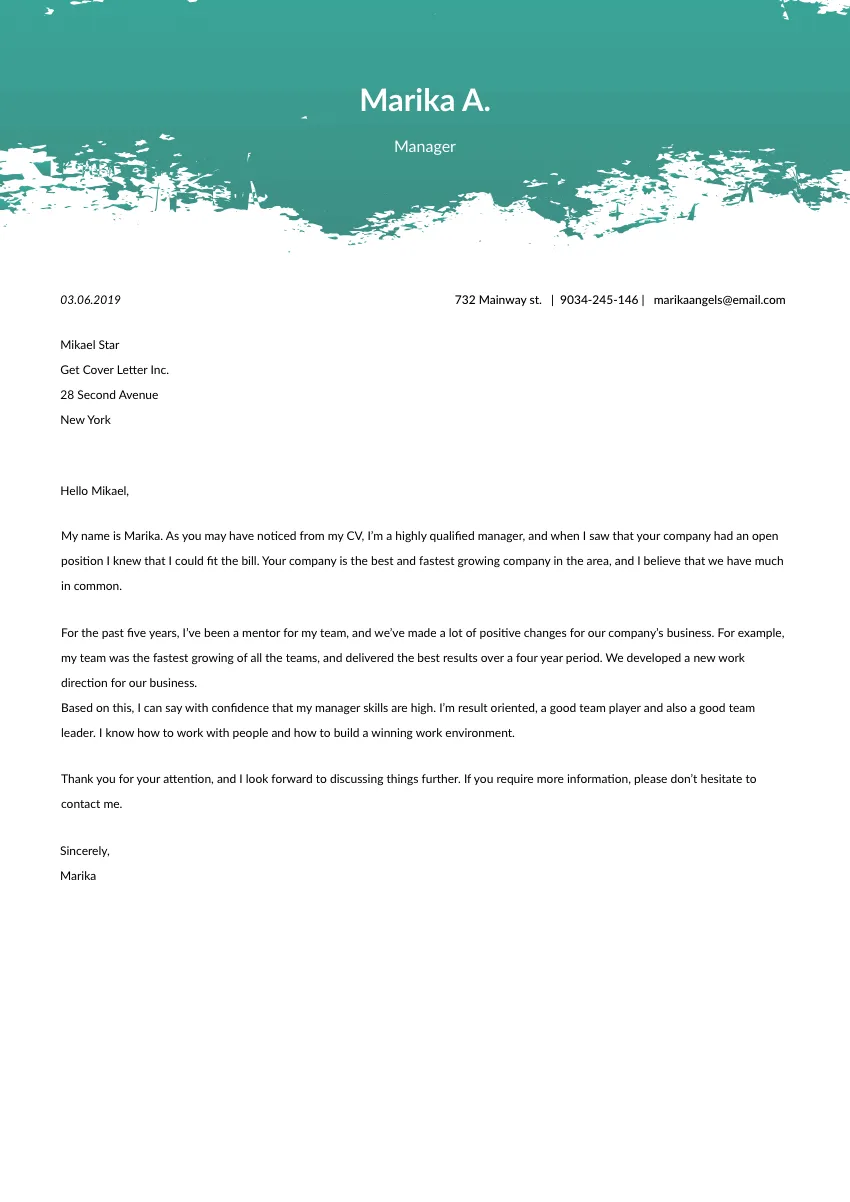
Before writing your cover letter, research the employer to understand their values, mission, and the specific needs of their clients or patients. This information will help you personalize your letter and demonstrate your genuine interest in the organization. Check their website, social media profiles, and any online reviews to gather insights that you can incorporate into your letter.
Matching Skills to Job Requirements
Carefully analyze the job description and identify the essential skills and qualifications the employer is seeking. Then, structure your cover letter to highlight how your skills and experience align with those requirements. Provide specific examples that demonstrate your ability to meet those needs, using the keywords from the job description to show your understanding of the role.
Using Keywords Effectively
Incorporate relevant keywords from the job description throughout your cover letter. This helps the employer quickly see that you possess the necessary qualifications and ensures that your application is easily searchable by applicant tracking systems. However, avoid keyword stuffing; instead, use keywords naturally and organically within the context of your writing.
Structuring Your Caregiver Cover Letter
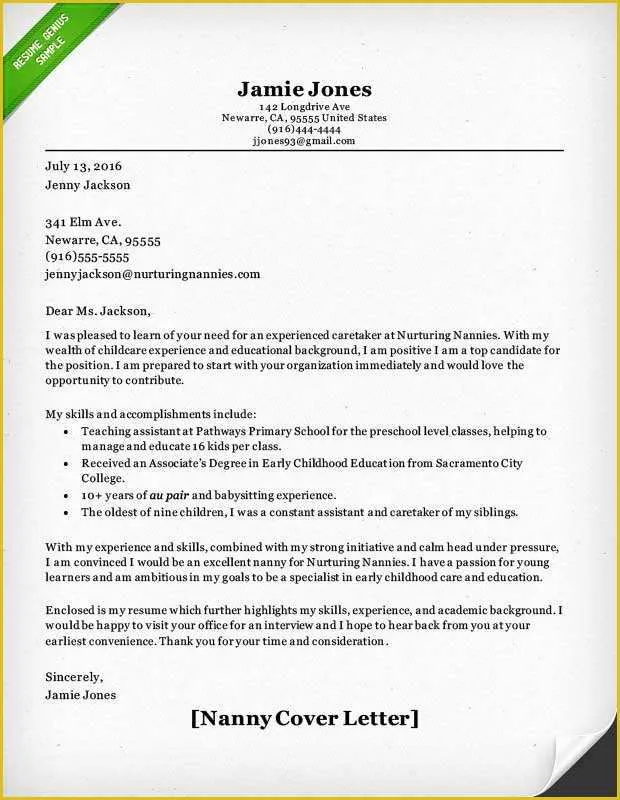
The structure of your cover letter is just as important as its content. A well-structured letter is easy to read and allows the employer to quickly grasp your key qualifications. Follow a standard format, with a clear opening, well-organized body paragraphs, and a strong closing. Ensure your letter is formatted professionally, using clear fonts, adequate spacing, and concise paragraphs. A well-structured letter also makes it easier for the reader to read and understand your writing.
Contact Information and Salutation
Start your cover letter with your contact information, including your name, address, phone number, and email address. Then, address the letter to the hiring manager or the specific person listed in the job posting. If you can’t find a name, use a professional salutation like “Dear Hiring Manager.”
Opening Paragraph Grab Attention
The opening paragraph is your first chance to make a strong impression. Start with a compelling statement that grabs the employer’s attention. State the position you’re applying for and briefly mention how your skills and experience align with the job requirements. Express your enthusiasm for the opportunity and your understanding of the employer’s needs.
Body Paragraphs Showcase Your Value
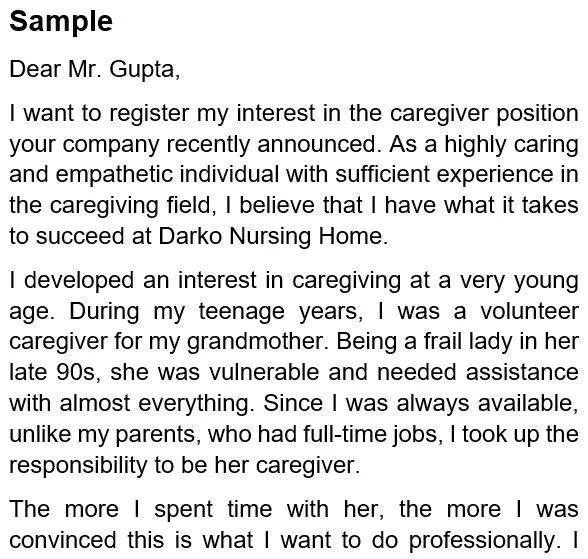
In the body paragraphs, elaborate on your skills and experience, providing specific examples that demonstrate your ability to perform the job duties. Use the STAR method (Situation, Task, Action, Result) to showcase your achievements. Focus on how your actions positively impacted previous patients and their families. Highlight your ability to communicate effectively, provide emotional support, and adapt to the care recipient’s changing needs.
Closing Paragraph Call to Action
In your closing paragraph, reiterate your interest in the position and express your enthusiasm for the opportunity to contribute to the organization. Thank the employer for their time and consideration, and include a clear call to action, such as requesting an interview or stating your availability for a follow-up call. Proofread your letter carefully before sending it.
Proofreading and Editing
Before submitting your cover letter, carefully proofread and edit it to ensure it is free of errors. Typos and grammatical mistakes can create a negative impression, so take the time to review your letter multiple times. Check for spelling errors, grammatical errors, and punctuation mistakes. Ensure that your letter is well-organized, easy to read, and clearly communicates your qualifications. It is always advisable to have someone else review your cover letter.
Common Mistakes to Avoid
Avoid common mistakes that can undermine your cover letter. Avoid generic language and instead focus on tailoring your letter to each specific job. Steer clear of clichés and overly formal language. Make sure that the cover letter is concise, no longer than one page, and easy to read. Make sure to avoid any negative information or any disparaging remarks about former employers. Proofread meticulously to avoid typos or grammatical errors. By avoiding these common pitfalls, you can increase the effectiveness of your cover letter and improve your chances of getting hired.
In conclusion, crafting a compelling caregiver cover letter is a critical step in the job application process. By following the guidelines outlined in this article, you can create a cover letter that highlights your skills, experience, and personality, making you a standout candidate. Remember to tailor your letter to each job, proofread carefully, and focus on showcasing your ability to provide compassionate and effective care. With a well-written cover letter, you will significantly increase your chances of landing a job interview and starting a rewarding career as a caregiver.
